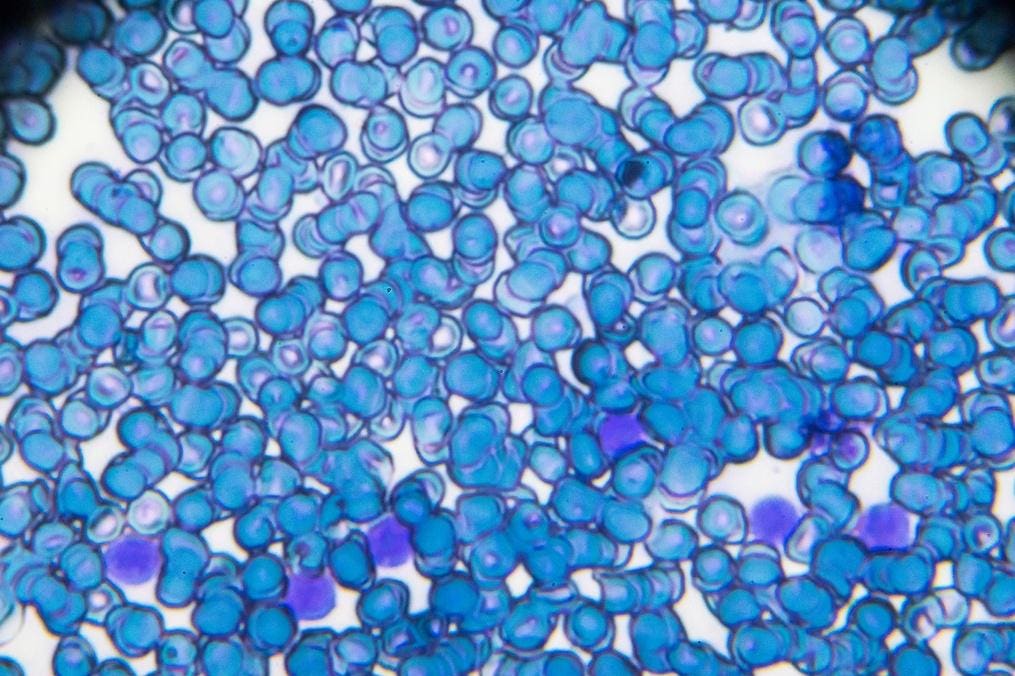Acute lymphoblastic leukemia ALL-L2 blood smear under light microscopy
By the time you are done reading this article, at least one person in the United States will be diagnosed with a blood cancer. Approximately every three minutes someone in America is diagnosed with one of the types of blood cancers.
Leukemia, a type of cancer of the body’s blood forming tissues, usually involves one’s white blood cells, or the cells that help fight off infection. In patients with leukemia, the body produces an excess amount of white blood cells that don’t function properly.
According to the American Cancer Society, there have already been over 59,000 new cases of leukemia diagnosed this year, and nearly 24,000 deaths from it in America. Although the exact cause is unknown, most scientists believe a combination of genetic and environmental factors play a role.
Leukemia is felt to occur largely when blood cells acquire changes, or mutations, to their genetic material. The cancer is usually diagnosed through different blood tests and bone marrow biopsy, a procedure that involves taking a small sample of bone and blood from the pelvis to evaluate for abnormal cells. More advanced tests are also sometimes used such as molecular and genetic tests that specifically attempt to identify genes, proteins and mutations that are associated with leukemia.
A Montana based molecular diagnostic company, Alercell Inc., is pioneering novel techniques to augment the way leukemia is diagnosed, treated and ultimately prevented. Their CEO and founder, Frederic Scheer, is working tirelessly to advance cancer detection and prevention after fighting his own battle with cancer.
In January of this year, Scheer and Alercell Inc. introduced Lena Q51, a groundbreaking Leukemia diagnostic test capable of detecting up to 51 gene mutations in a single patient. The objective is to analyze the genetic landscape of multiple fusion genes in patients. This innovative test utilizes highly multiplex quantitative PCR (Polymerase Chain Reaction), which is a laboratory technique that amplifies DNA, or genetic material necessary to identify various mutations. Lena Q51® is able to provide results in less than four hours, whereas most other molecular tests and bone marrow biopsy tests require days before results are found.
Identifying various gene mutations in leukemia remains crucial in understanding the prognosis and even the treatment for the various types of leukemia. As an example, patients that test positive for the FLT3 mutation often have a high risk of recurrence following treatment. Knowing that a patient has this specific mutation can affect their overall prognosis, as doctors can offer these patients a bone marrow transplant that can eventually prolong their lives.
Similarly, patients with the gene mutations known as NPM1 and CEBP⍺ often have a better chance of recovery than those without these mutations. This critical information can help guide therapy, as oncologists may recommend chemotherapy instead of bone marrow transplantation or a combination of both.
The more information that is known about a disease, the more effective treatment and prevention plans can be implemented by physicians. In the case of leukemia, the more mutations that are known or can be identified that are associated with the cancer, the more likely patients can be given the appropriate treatment to prolong life. In this way, treatment can be personalized and tailored to the individual patient.
Although not currently FDA approved for Leukemia diagnosis, Lena Q51® could also have applications for preventive medicine. Theoretically, select patients could receive this test even before the onset of symptoms and if they test positively, could be identified and treated so they never experience the burden of cancer symptoms and treatment.
Dr. Kashif Ali, a board certified hematologist-oncologist that practices in Maryland, states, “Currently, we have not adopted guidelines in pre-emptive treatment based on just mutations. Those trails will be forthcoming.” He then adds, “Testing for mutations will be the future of preventive medicine in oncology.”
In a one-on-one interview, Scheer explains, “We believe in prevention and the necessity to change the mentality of the healthcare industry at large.” Prevention remains one of the fundamental pillars of his company and personal philosophy.
As Scheer states, “This is my new life challenge, making sure that Alercell will change the way we approach cancer and make sure that we detect it as early as possible, prior to going through the grueling treatments.”


